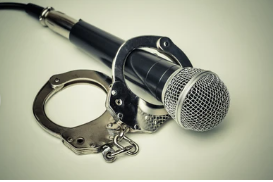Several residents of Northern Bahr el Ghazal State have raised concerns about being gagged from expressing pressing issues and criticizing officials in the state, citing the arrest of several activists in the recent past.
Article 24 of the Transitional Constitution of the Republic of South Sudan grants the right to freedom of expression and a pluralistic media as fundamental human rights for all citizens.
However, authorities have continued to suppress the constitutional rights of citizens and arrest those with divergent opinions. A wave of arrests of activists in the last few years raises questions about what will happen as the country heads towards elections, which necessitate civic space and freedom of expression and speech.
Samuel Garang Dut, the Deputy Commissioner of the Northern Bahr el Ghazal State Revenue Commission, who was sentenced to eight months in jail in 2021 by the Aweil High Court, said he was found guilty in a defamation row between him and the former Governor Tong Akeen.
Last month, Dut Kuot Akok, an activist, was sentenced to 14 months in Aweil Central Prison following his continuous criticism of the current governor, Simon Ober Mawut. Another politician belonging to the Sudan People’s Liberation Movement (SPLM) Party, Angelo Akuoch, was detained for months.
Speaking to Radio Tamazuj over the weekend, many state intellectuals and residents confirmed that there have been issues with freedom of expression. Aweil resident, Wek Garang, also decried the lack of civic space.
“There are challenges when it comes to freedom of expression because if you express yourself and it is found that you are criticizing top officials, you will face a lot of problems,” he explained. “Young people who are always vocal on the pressing issues are denied even their legal rights.”
Another citizen, Longar Akol, recommended the provision of tools, circulation of newspapers and magazines, and free platforms to boost freedom of expression and information flow from top to bottom and vice versa.
“Freedom of expression requires platforms which can boost information flow because freedom of expression is meant for intellectuals, and that needs tools to be availed to enhance the process,” he said.
Meanwhile, a member of the state parliament, Garang Kuol Mabior, revealed that there are ongoing efforts to ensure that the activist who has been jailed is set free.
“We are working to ensure that the convicted activist is freed in the next few days, but that cannot give us the right to condemn anyone,” he stated.
Responding to a question about the role of legislators in supporting democracy, Mabior revealed that freedom of expression is one of the principles of democracy and that parliament promotes responsible freedom of expression and speech.
An Aweil-based civil society activist, Angelina Agau Thiep, said the state government has to create a conducive environment for the conduct of the upcoming presidential and general elections.
“The government has to provide free platforms for citizens because we are heading toward elections to elect leaders who will manage the country for the interests of South Sudanese and not politicians’ interests,” she said.




